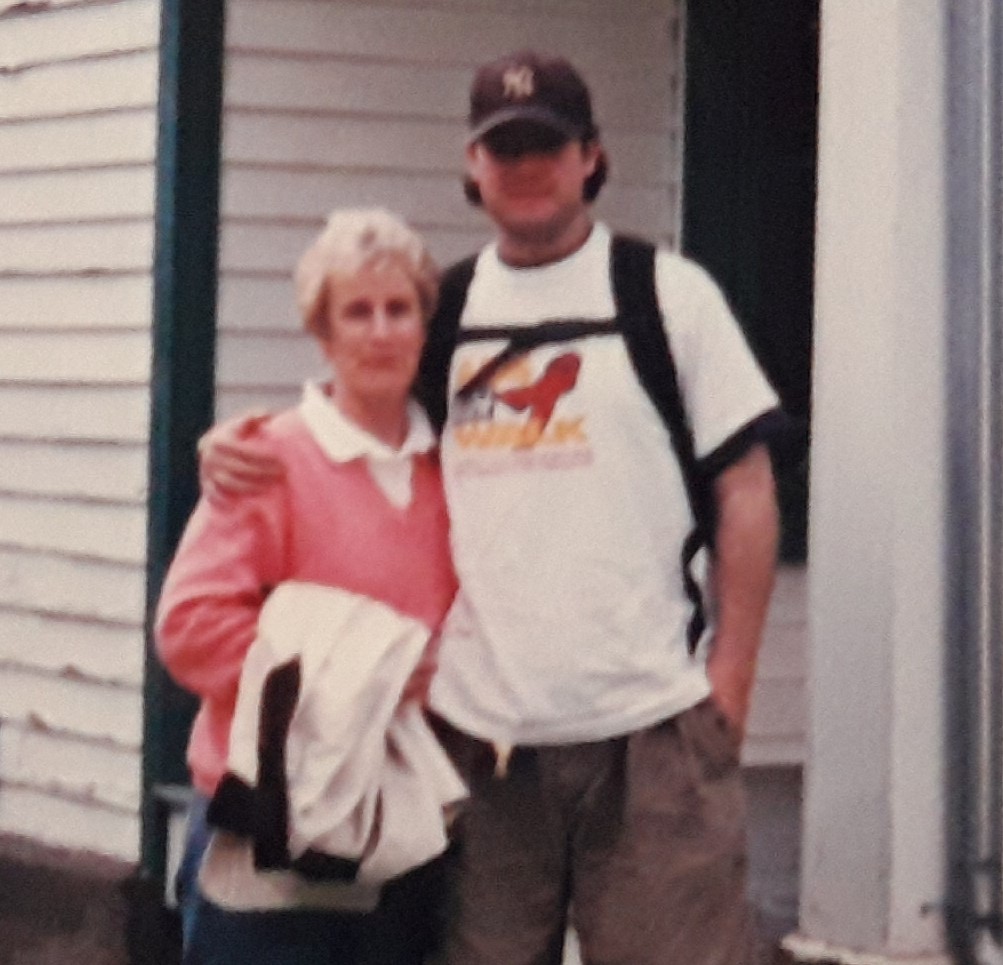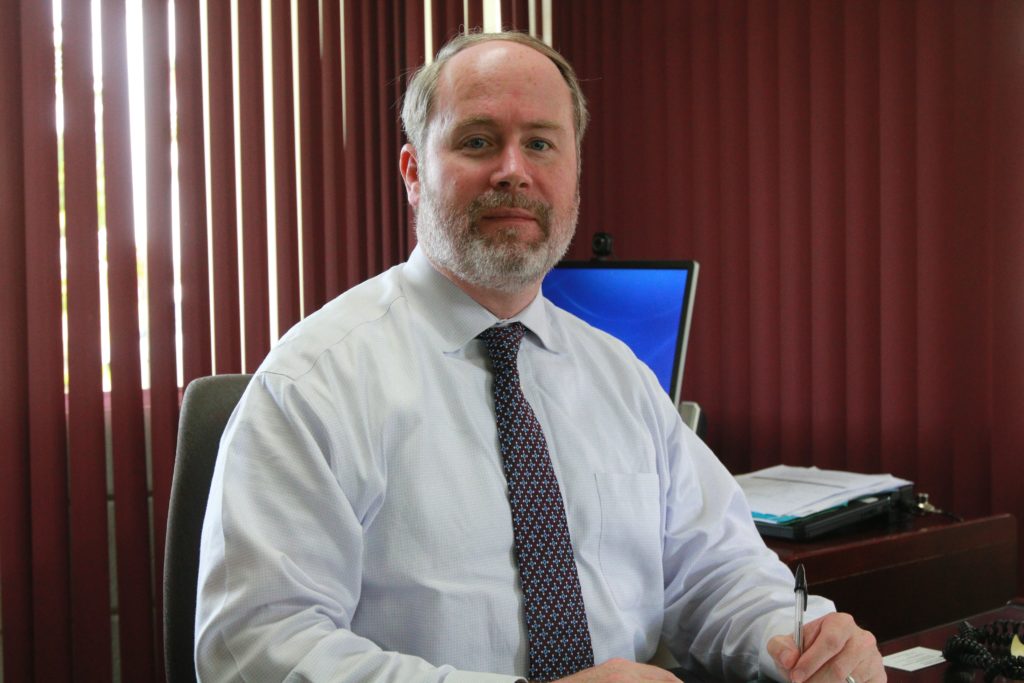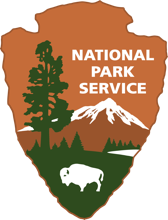Although his professional career includes over 20 years, Rob Ahern said he’s never had a worse day at any job than when he was unprepared to teach a trail group of fourth graders at the Cuyahoga Valley Environmental Education Center (CVEEC).
Rob was a new intern at the CVEEC teaching his fourth week of classes. He had focused on learning the level two curriculum and had worked with 7th and 8th graders during the first few weeks as a field instructor. He was assigned to a group of 4th graders and didn’t give it much thought — how much different could younger students be than older, more experienced students?
Rob knew he had no experience with teaching this age group and had to put his training into action for the very first time. He feared it was going to be a very long and uncomfortable few hours: and it was.
He may not have known it at the time, but moments like these on staff at the CVEEC would prepare him for a very successful future.
Nature has always been a part of Rob’s life. Raised on a house by the water, he spent his days in and around the ocean in Key West, Florida. Through his upbringing, he developed a deep curiosity and fascination with the natural world. His course of studies, therefore, were of no surprise – he graduated with a Bachelor of Science in zoology and worked for an entomologist in landscape ecology, first as a field assistant and later as a laboratory assistant.
During his last year at Miami University, Rob applied to several marine biology Master’s programs, but to no avail.
“The truth is that I didn’t really know what I wanted to do with my life,” Rob said.
As luck would have it, he saw an advertisement on campus for a Cuyahoga Valley Environmental Education field instructor. He attended the information session, sent in his application, and had an interview, although he doesn’t remember anything about that now.
What he does recall, however, is how he felt during the welcome session with the first school group after training.

“Looking at the kids’ faces and feeling the positive, almost anxious energy of the group while we sang ‘All the Rivers Run,’ I knew I’d made a great decision and that I was fortunate.” Rob said. “It turned out that sharing my passion for the natural world with students, many of whom hadn’t had the experiences I had as a kid, was incredibly gratifying.”
Interestingly, Rob reminisces that the most rewarding parts of working at the CVEEC were also some of the most difficult.
“On the one hand, it was amazing to see the relationships that developed between field instructors and students in such a short time – less than a week. Many of the kids who came to the program hadn’t had any experience in the outdoors, and it was great to share that with them, help them feel more comfortable with the unknown, and hope the experience would spark something in them the way it did in me. There were also students who hadn’t had an immersive learning experience like the CVEEC program, with teachers who were weird and fun, totally engaged, and trying hard to help them feel heard and successful.”
“It turned out that sharing my passion for the natural world with students, many of whom hadn’t had the experiences I had as a kid, was incredibly gratifying.”
Rob Ahern
“But the goodbyes were difficult, particularly during my second year when I did the school pre-visits beforehand and knew the challenging conditions to which many students would return. Knowing about some of those realities, I am fortunate to have had the opportunity to share, albeit briefly, a different reality that was fun, positive and empowering,” Rob said.
After a year as a field instructor, he was hired into an administrative position that oversaw the residential program.
“Deb Yandala and Janice Matteucci recognized that I had leadership potential but lacked the people skills required to be an effective manager. Their offer to me was conditional on me committing to work with them to acknowledge, identify, and strengthen my weaknesses,” Rob said. “Their honesty with me and the opportunity they gave me to improve myself changed my life.”
After working at the CVEEC, Rob’s career developed through a progression of roles with increasing scope, complexity, and responsibility – from completing a Master’s degree, to volunteering for the Peace Corps in Guatemala, to entering a doctoral program in entomology.
After completing his degree, he was offered a position as Visiting Research Associate at Michigan State University in East Lansing where he led and conducted research on the ecology, management and policy implications of invasive species in the Great Lakes region. He worked in that role for two years before joining the United States Department of Agriculture (USDA) as a Risk Analyst in the Pest Epidemiology and Risk Analysis Laboratory (PERAL) in Raleigh, NC. While at USDA, he also worked as an International Trade Specialist in Washington, DC, where he managed trade issues for a broad portfolio of countries.

“Based on lessons I learned during my second year at the CVEEC, I have worked continuously to hone and improve my management style and leadership abilities,” Rob said. “For me, leadership is much more than a title or part of an occupation – it is an ongoing opportunity and commitment to improve yourself, those around you, the team, and the organization; there is always room to grow and learn, and you’re never done.”
Rob is currently the Manager of the Agricultural Health, Food Safety and Food Quality Program at the Inter-American Institute for Cooperation on Agriculture (IICA) in San Jose, Costa Rica. He leads the development and implementation of programs to strengthen animal health, plant protection, food safety, and food quality systems in IICA’s 34 Member Countries. The program he manages strengthens the viability and prosperity of small-, medium-, and large-scale agricultural producers and improves livelihoods throughout the Americas.
Two years ago, with funding from the USDA, Rob established a leadership program for mid-career professionals from countries throughout the Americas. The course, which is 10 months long and includes in-person sessions and virtual coursework, is a collaboration that he developed with the United Nationals University for Peace, which is also based in Costa Rica. Students learn positive leadership techniques and apply the skills they learn to develop and implement a project in their home country. In addition to preparing to be leaders of tomorrow, participants become part of a diverse network of professionals who support one another regardless of nationality, an outcome that Rob said is very consistent with what he tried to teach so many years ago at the CVEEC.
Reflecting on his time living in Cuyahoga Valley National Park, Rob shares that the experiences he had and the people he met along the way have helped him grow and become a better version of himself.
“At the CVEEC I learned that preparation, flexibility, adaptability, and a positive attitude are the keys to success, regardless of who you are or where you work,” Rob said. “And if you can succeed in front of a room full of fourth graders, there’s no audience you can’t face.”





